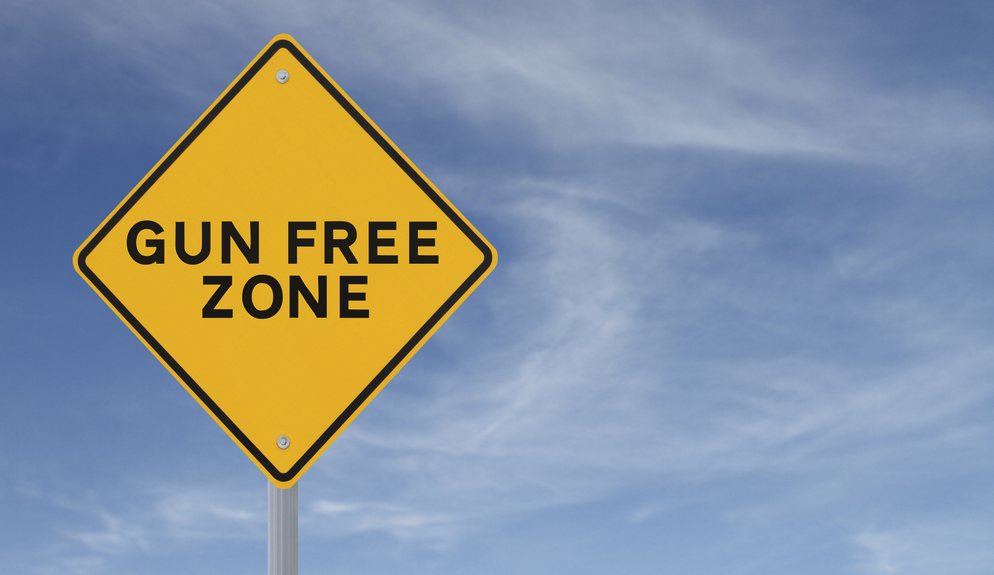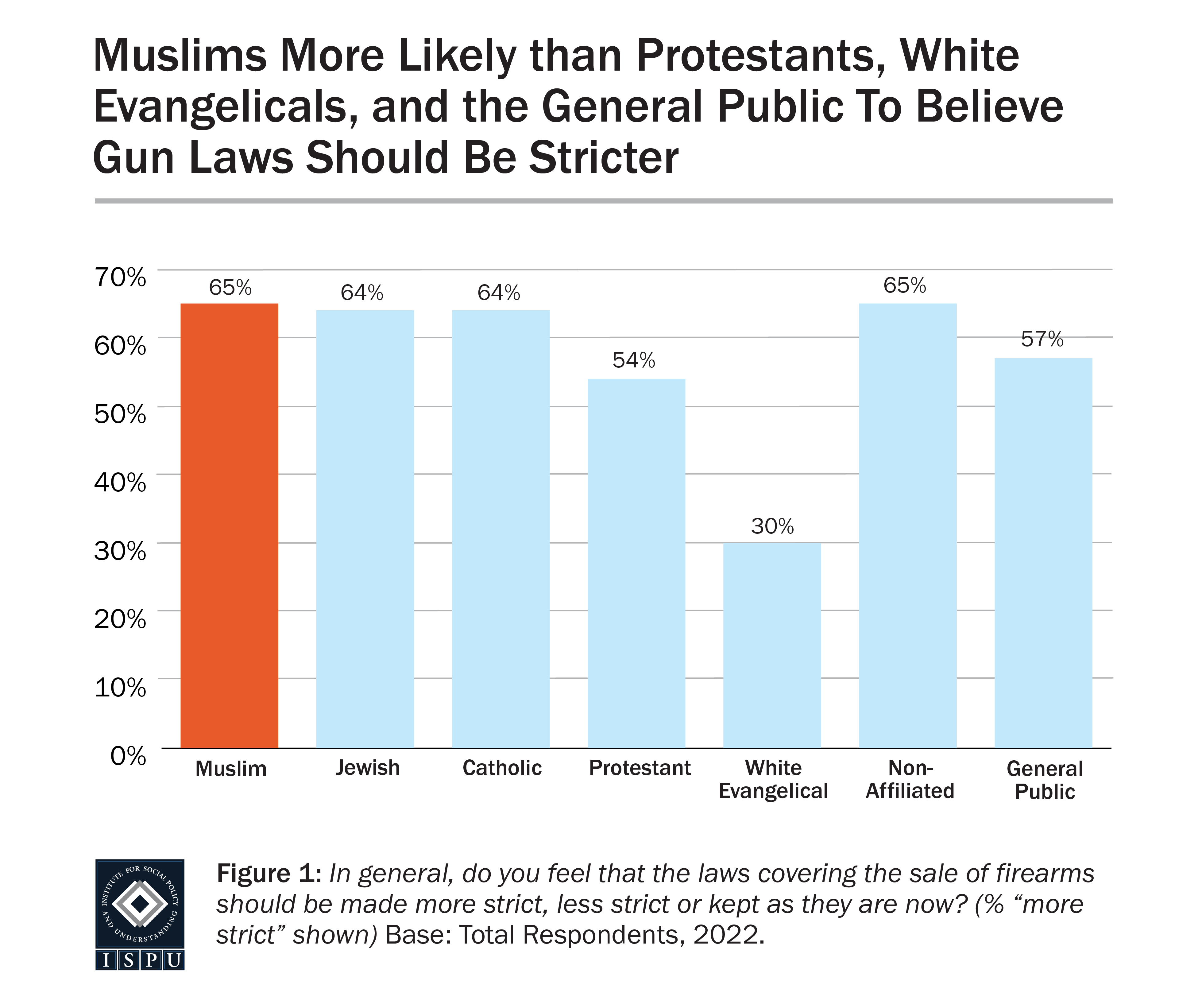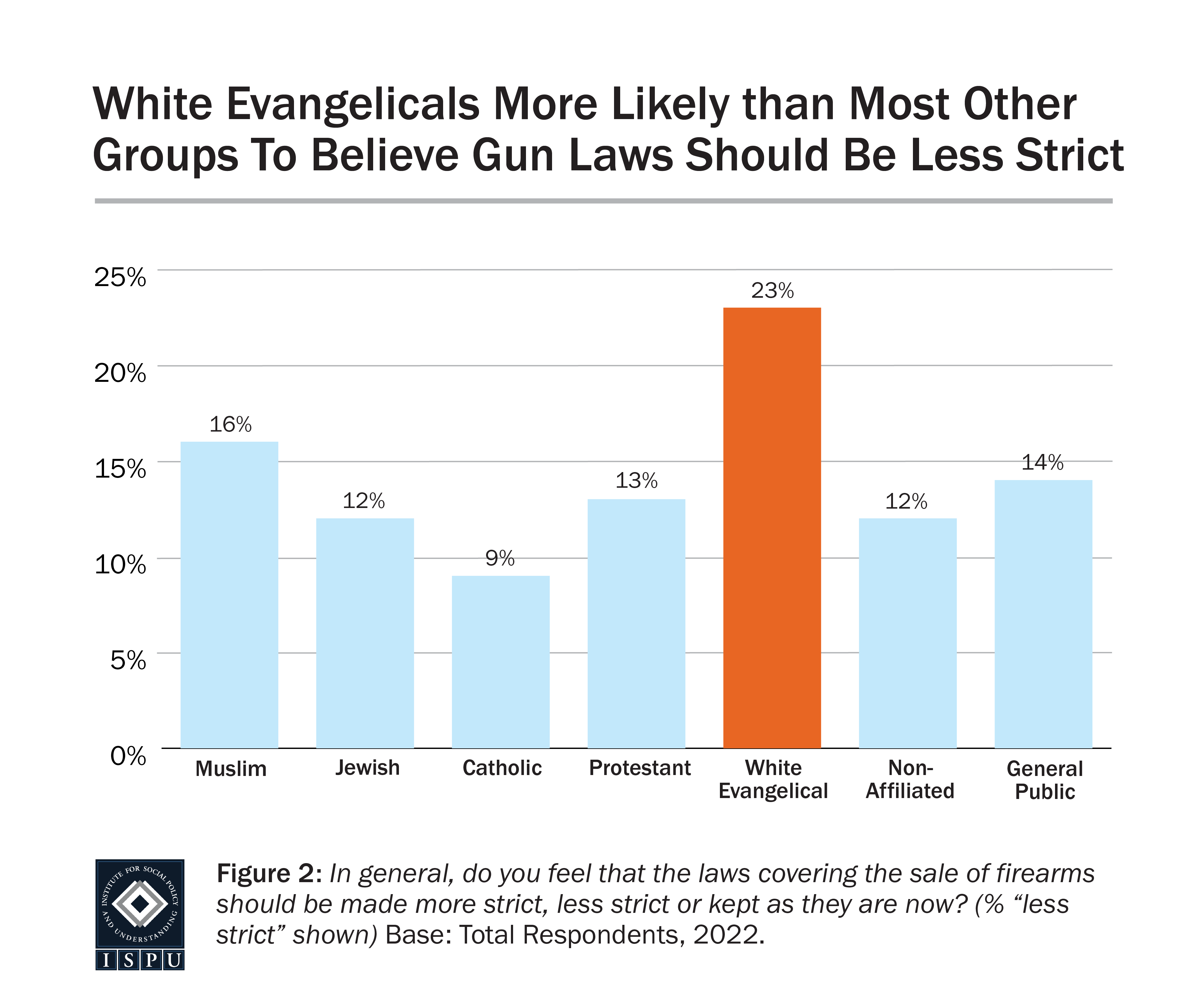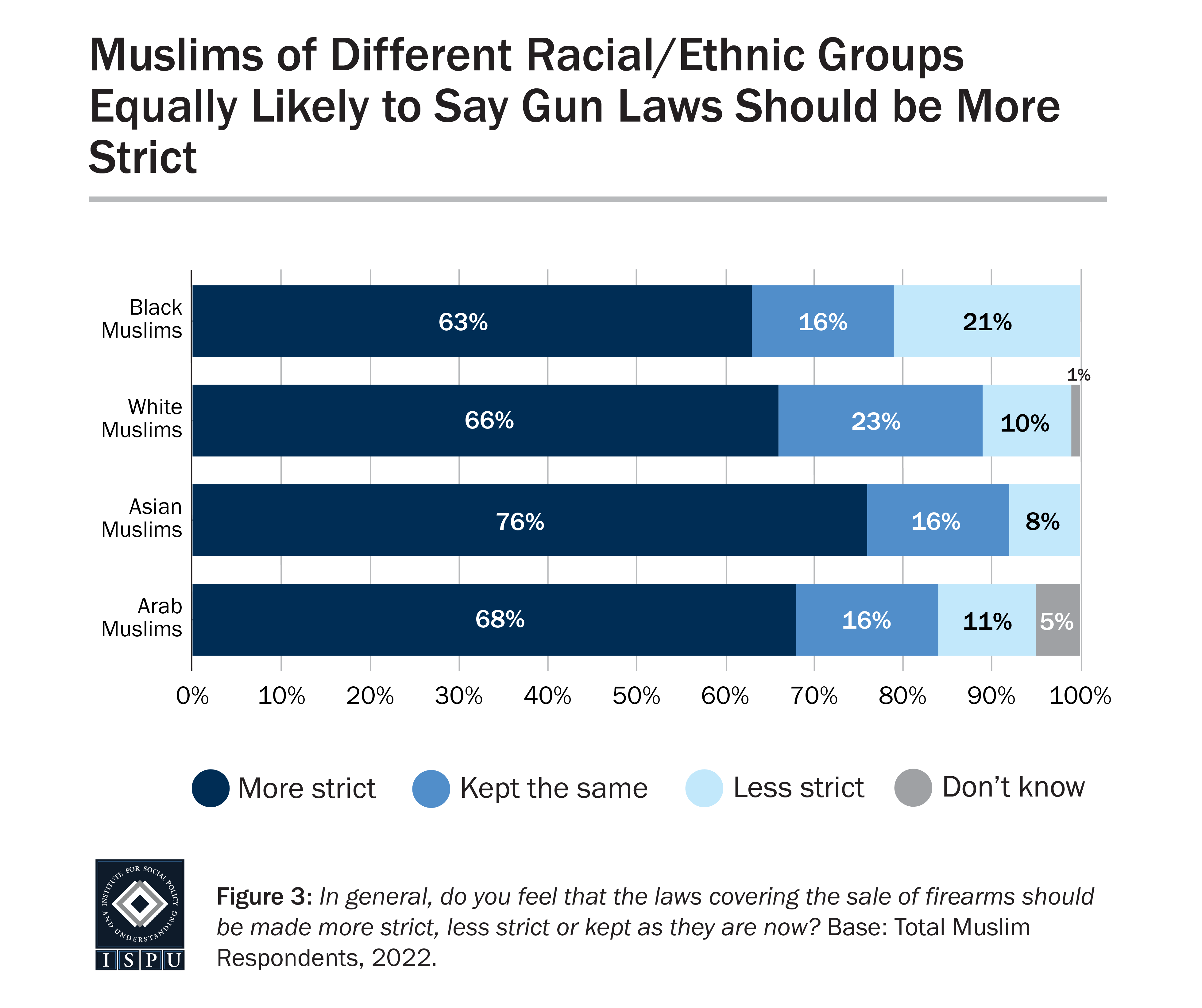
Most American Muslims Believe Laws Covering the Sale of Firearms Should Be Stricter
June 10, 2022 | BY ERUM IKRAMULLAH
On May 24, 2022, 21 people were killed at Robb Elementary School in Uvalde, Texas in a mass shooting (defined as 4 or more individuals killed). According to data from the Washington Post, since the 1999 shooting at Columbine High School, more than 311,000 children in our country have experienced gun violence at school. 185 have been killed. 369 have been injured.
Beyond students, gun violence has impacted the lives of countless Americans. Ten days before the Robb Elementary School shooting, an 18-year-old shot and killed 10 mostly Black shoppers and injured 3 others in a racially-motivated shooting at a supermarket in Buffalo, NY. Seven days after the Robb Elementary School shooting, four people were shot and killed at a hospital campus in Tulsa, Oklahoma. All in the month of May.
Mass shootings have been found to be a uniquely American problem, so it is up to all of us to understand and solve this pressing challenge. Given the recent string of shootings and gun violence and the upcoming 2022 midterm elections, the policy issue of laws covering the sale of firearms is top of mind for many Americans. How do American Muslims, alongside other American faith and non-faith communities, rate current gun laws? In March 2022, the Institute for Social Policy and Understanding (ISPU), set out to explore this issue by asking the following question in our landmark American Muslim Poll:
In general, do you feel that the laws covering the sale of firearms should be made more strict, less strict or kept as they are now?
MORE ANALYSES
The Majority of American Muslims Believe Abortion Should be Legal in All or Most Cases
Black Muslims and Younger Muslims Least Likely to Be Vaccinated
Substance Abuse and Addiction in the Muslim Community
The (Dis)parity of White Muslim Political Attitudes
American Muslim Policy Priorities
Five Surprising Facts about Divorce in American Muslim Communities
Not Immune: Some Muslims in America Internalize Islamophobia

Most American Muslims Believe Laws Covering the Sale of Firearms Should Be Stricter
June 10, 2022 | BY ERUM IKRAMULLAH
On May 24, 2022, 21 people were killed at Robb Elementary School in Uvalde, Texas in a mass shooting (defined as 4 or more individuals killed). According to data from the Washington Post, since the 1999 shooting at Columbine High School, more than 311,000 children in our country have experienced gun violence at school. 185 have been killed. 369 have been injured.
Beyond students, gun violence has impacted the lives of countless Americans. Ten days before the Robb Elementary School shooting, an 18-year-old shot and killed 10 mostly Black shoppers and injured 3 others in a racially-motivated shooting at a supermarket in Buffalo, NY. Seven days after the Robb Elementary School shooting, four people were shot and killed at a hospital campus in Tulsa, Oklahoma. All in the month of May.
Mass shootings have been found to be a uniquely American problem, so it is up to all of us to understand and solve this pressing challenge. Given the recent string of shootings and gun violence and the upcoming 2022 midterm elections, the policy issue of laws covering the sale of firearms is top of mind for many Americans. How do American Muslims, alongside other American faith and non-faith communities, rate current gun laws? In March 2022, the Institute for Social Policy and Understanding (ISPU), set out to explore this issue by asking the following question in our landmark American Muslim Poll:
In general, do you feel that the laws covering the sale of firearms should be made more strict, less strict or kept as they are now?
The majority of American Muslims believe current gun laws should be stricter
More than 6 in 10 Muslims (65%) believe that current laws covering the sale of firearms should be stricter, on par with 64% of Jews and Catholics and 65% of the religiously non-affiliated. Muslims are more likely than Protestants (54%), white Evangelicals (30%), and the general public (57%) to hold this view.
Among Muslims, men and women are equally likely to believe that gun laws should be stricter, both at 65%. However, among the general public, women are more likely than men to believe gun laws should be stricter (64% of women vs. 51% of men). This gender difference is also found among Protestants (60% of women vs. 42% of men).
When looking at the proportion who say gun laws should be less strict, we find that American Muslims are as likely as all other groups to take this view (16% of Muslims, 12% of Jews, 9% of Catholics, 13% of Protestants, 23% of white Evangelicals, 12% of the non-affiliated, and 14% of the general public). White Evangelicals are more likely than most other groups (except Muslims) to hold this view. Muslim men are more likely than Muslim women to believe gun laws should be made less strict (20% vs. 12%, respectively). This is also the case for the general public (20% of men vs. 8% of women), Catholics (16% of men vs. 4% of women), and Protestants (21% of men vs. 9% of women).
Muslims less likely than Catholics, Protestants, White Evangelicals, and the general public to believe gun laws should be kept the same
Roughly one-fifth of American Muslims (18%) believe that gun laws should be kept as they are now, which is less likely than 26% of Catholics, 33% of Protestants, 47% of the white Evangelicals, and 28% of the general public. Jewish Americans (24%) and the non-affiliated (22%) are on par with Muslims in their view that gun laws should be kept as they are. Muslim women are more likely than Muslim men to believe that gun laws should be kept as they are (23% of Muslim women vs. 14% of Muslim men).
Majorities of Muslims of all ages and racial/ethnic groups equally likely to believe gun laws should be more strict
Among both Muslims and the general public, there are no differences by age on views about gun laws. When comparing between Muslims and the general public by age, we find that older Muslims aged 50+ years old are more likely than 50+ year olds in the general public to believe gun laws should be made stricter (69% vs. 56%, respectively). Additionally, 18-29 year old and 30-49 year old Muslims (18% and 17%, respectively) are less likely than their age counterparts in the general public (30% and 24%, respectively) to believe gun laws should be kept as they are.
American Muslims do not vary by race/ethnicity when it comes to the views that gun laws should be made stricter or kept as they are. In fact, among Muslims, the majority of all racial/ethnic groups say that gun laws should be more strict (63% of Black Muslims, 66% of white Muslims, 76% of Asian Muslims, and 68% of Arab Muslims). However, when looking at those who say gun laws should be made less strict, we find that Black Muslims are more likely than white and Asian Muslims to hold this view (21% vs. 10% and 8%, respectively). Comparing between Muslims and the general public by race, we find that white Muslims are more likely than white Americans in the general public to believe gun laws should be stricter (66% vs. 51%, respectively) and are less likely to believe gun laws should be kept as they are now (23% of white Muslims vs. 32% of white Americans in the general public). Moreover, Black Muslims are more likely than Black Americans in the general public to believe laws covering the sale of firearms should be made less strict (21% vs. 9%).
In reviewing these findings, it is important to keep in mind that the poll question wording does not specify local, state, or federal gun laws. The poll is fielded to a national sample of American Muslims and each state is different in its laws covering the sale of firearms. Individuals may choose to live in states or local areas where they agree with the local politics, or they may feel that their view is contrary to the prevailing view in their state. Thus, local conditions may inform how people judge what is stricter or less strict.
What is clear is that in the wake of yet another month of mass shootings in our country, a majority of Americans across faith, age, racial/ethnic groups believe that laws covering the sale of firearms should be made stricter, with smaller minorities believing that laws should remain the same or be less strict. As our country and communities continue to grapple with gun violence, we will need to find a path forward through these divides.

Erum Ikramullah is a Research Project Manager at ISPU, where she manages the day-to-day activities of the organization’s research studies. Learn more about Erum→




